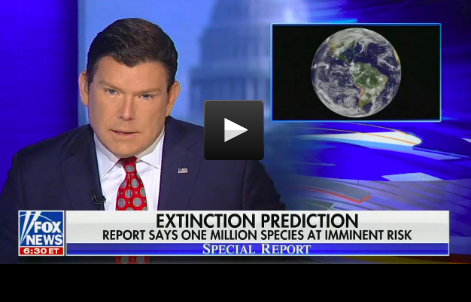
May 6th Edition of Brett Baier’s Fox News Prime Time Show “Special Report”
The United Nations report on the extinction crisis that came out on Monday made a relatively big splash. ICYMI, a group of scientists called the Intergovernmental Science-Policy Platform on Biodiversity and Ecosystem Services (IPBES), determined that biodiversity is declining at the fastest rate in human history, and only “transformational changes” to the way society operates can save the planet from ruin. The chair of the IPBES said, “We are eroding the very foundations of our economies, livelihoods, food security, health and quality of life worldwide. The report also tells us that it is not too late to make a difference, but only if we start now at every level from local to global.” So where do we start? At a global meeting to be held in Beijing next year, the nations of the world could agree to place real limits on development and set aside a percentage of the planet that is reserved for nature.
- In order to pressure countries for such limits, a group of nearly 100 nonprofits worldwide has started a global campaign to designate 30% of the Earth’s surface for protection by 2030, and 50% by 2050, in an effort to avert the extinction crisis.
- This campaign is called the “Global Deal for Nature” and we reported on it last month, when a study published in the Journal Science Advances put forth a plan identifying conservation areas with significant biodiversity value that could make up the 30% that would be subject to certain protections, and another 20% of the planet that would function as climate stabilization areas, or areas that remain in a natural state.
May 8, 2019 » Brett Baier, endangered species, extinction, Fox News, IFAW, nature, United Nations


